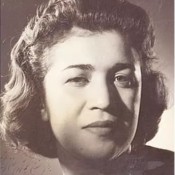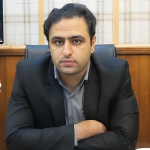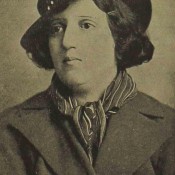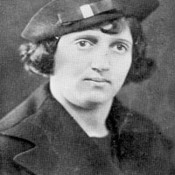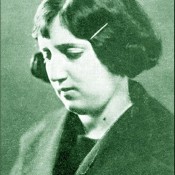Title
Auhtor
Narrative as a Rhetorical Device in Līmah Āfshīd’s “The Old Woman”
Introduction This article analyzes the deployment of multiple genres, or poly-generic capacity, and particularly the use of narrative games as a rhetorical device and figure of poetic language in Līmah Āfshīd’s poetry to illustrate the…
Nayyirah Saʿīdī, a Poet in Search of Women’s Rights
Introduction One significant outcome of Iran’s encounter with Western thought, beginning in the early 14th/20th century, was the emergence and growing participation of women in scientific, social, cultural, political and artistic fields. During the Qajar…
Networking Women Poets: Connecting Furūgh Farrukhʹzād and Adrienne Rich
Introduction During the 1960s and 1970s, female poets relied heavily on translation to establish connections with one another. The primary objective of the first and second-wave feminism in translation was to articulate connections between female…
Nūr Jahān Baygum (1577–1645), Queen of India, Poet of the Sixteenth and Seventeenth Centuries
Nūr Jahān Baygum was one of the beloved and powerful wives of Nūr al-Dīn Jahāngīr (1569–1627), the Mughal emperor of India, and the first lady of his harem. Her date of birth is recorded as…
Nūrī Sayyārah Gīlānī (Nūr Arfaʿ 1286–1353/1907–1974)
Introduction Nūrī Sayyārah Gīlānī (1286–1353/1907–1974) was a relatively little-known poet in the Iranian intellectual and literary sphere. Two principal factors have contributed to the limited attention her works have received: first, her poems were not…
Of the Sins of Furūgh Farrukhzād
“Sin” (Gunah) is probably the most well-known poem of Forugh Farrokhzad, though it is not one of her best, even in comparison with most of the poems before the period of Another Birth (Rebirth). Apparently…
Opening the Drawn Curtain: Decoding the Gendered Personhood of the ‘Woman Poet’ in Persian Poetry
Of all the many ways in which literature can be delineated and categorized, distinctions along gender lines are perhaps the most complex. Debate around this label, and its implied hierarchy of writerly worth, remains divisive…
Parvīn Dawlatābādī, the Poet of Childhood Innocence
Parvīn Dawlatābādī: Life and Works Parvīn Dawlatābādī (1303–1387/1924–2008) was born in Dawlatabad, a town in the city of Isfahan. Her mother, Fakhr Gītī, served as the principal of the Nāmūs School in Isfahan, while her…
Parvīn Dawlatābādī: The Poet of the Literary Elite
Figure 1. Photo of the young Parvīn Dawlatābādī (Courtesy of Shīvā Dawlatābādī, taken February 7, 1955 in Paris). The Life and Works of Dawlatābādī1“Originally written in Persian, this article is translated by the editorial…
Parvīn Iʿtisāmī and Women’s Rights?
Introduction In the realm of feminist Persian poetry, certain names are frequently encountered, including Tāhirah Qurrat al-‘Ayn (AH 1230–1268/1817–1852), Zandukht Shīrāzī (1288–1331/1909–1953), Simin Behbahani (1306–1393/1927–2014), Forough Farrokhzad (1313–1345/1934–1967), and, more recently, Zhālih ‘Ālamtāj Qā’im-Maqāmī (1262–1326/1883–1947)….
Parvīn Iʿtisāmī’s Eloquent Response to Patriarchy*
Parvīn Iʿtisāmī’s Dīvān contains a short poem in which she explicitly states that “Parvīn is not a man”: The heart must be kept polished from the dust of futile thoughts so that the demon knows…
Parvīn Iꜥtisāmī, A Major Persian Poet for All Time
Parvīn I‘tisāmī, along with Īraj Mīrzā and Poet-Laureate Bahār, was the most prominent poet of early twentieth-century Iran, the form of whose poems was generally in the neoclassical style. And along with the latter two,…
A
- Afghan Women Poets in the Digital Age
- Anecdotes about Mihrī Hiravī in the Tazkira Tradition With Poems Newly Attributed To Her
- Ashraf Mishkātī: The Love-Stricken Poet of Gilan
- Azerbaijani Women Poets
- A Gadamerian Approach to the Hermetic Poetry of Fīrūzah Mīzānī and Parīmāh Aʿvānī
- A Lady Without Passport: Rābiʿah among the Islamic Republics
- A Look at the Lover’s Face in the Epic Poems of Hayrān Dunbulī
- A Private Journey Under the Red Shadow of an Umbrella: A Reading of Tāhirah Saffārʹzādah’s Poems from the Perspective of Dominance Approach
- A Thousand Years of Iranian Women’s Poetry
B
C
- Celestial Crossings: Literary Reception of Tāhirah Qurrat al-ʿAyn in the Indian Subcontinent
- Childhood in Afsānah Shaʿbānʹnizhād’s Poetry: Insights from an Iranian Woman Poet of Children’s Literature
- Comparative Women’s Poetry of Iran and Latin America
- Context and Concept: Early 20th Century Women Poets
D
E
F
- Farangīs Shantīʾā
- Farzānah Khujandī
- Fasl-i Bahār Khānum
- Females Poetics in Classical Persian Litarture
- Female Identity and Poetry
- Female Poets of Mughal Court
- Feminine Aspects of Modern Persian Poetics
- Feminine Intervention: Early Qajar Women Poets
- Feminine Qalandar in Persian Poetry
- Feminine Voice in Classical Persian Poetry
- Feminist Poetics
- Fiction Writer Women Poets
- From Boldness to Restraint: The Waning Audacity in the Poetry of Munīr Tāhā
- Furūgh Farrukhʹzād
H
I
J
K
L
M
- Madīna Gülgün
- Mahsatī Ganjavī’s Quatrains: Authenticity, Attribution, and New Discoveries
- Mahʹkāmah Muhassis Lāhijānī
- Maryam Sāvujī
- Medieval Women Poets of Iran
- Mihrī Hiravī, an Audacious Poet in the Age of Veiled Speech
- Mihrī Hiravī; An Audacious Poet in the Age of Discretion
- Modern Poetic Expressions
- Mughal Female Poets
- Munīrah Taha: The First Female Lyricist
- Mānā Āqāyī: The Poet of Ideas
- Mānā Āqāʾī
N
- Narrative as a Rhetorical Device in Līmah Āfshīd’s “The Old Woman”
- Nayyirah Saʿīdī, a Poet in Search of Women’s Rights
- Networking Women Poets: Connecting Furūgh Farrukhʹzād and Adrienne Rich
- Nūr Arfā
- Nūr Jahān Baygum (1577–1645), Queen of India, Poet of the Sixteenth and Seventeenth Centuries
- Nūrī Sayyārah Gīlānī (Nūr Arfaʿ 1286–1353/1907–1974)
O
P
- Pahlavi Women Poets
- Pakistani Women Poets Writing in Persian
- Parvīn Dawlatābādī, the Poet of Childhood Innocence
- Parvīn Dawlatābādī: The Poet of the Literary Elite
- Parvīn Iʿtisāmī and Women’s Rights?
- Parvīn Iʿtisāmī’s Eloquent Response to Patriarchy*
- Parvīn Iꜥtisāmī, A Major Persian Poet for All Time
- Parī Khān Khānum
- Persianate Jewish Women Poets
- Persian Mystic Women Poets
- Poetic Elements in the Works of Badrī Tundarī
- Politics of Gender and Desire in the Persian Qasīdah
- Polyphony in the Poetry of Rawyā Taftī
- Post-Revolution Iranian Women Poets
- Post-Revolution Poetry in Iran
- Public Reforms, Private Struggles: The Poetry and Activism of Malakah Iʿtizādī
R
S
- Safavid Women Poets
- Self-Expression in Women’s Poetry
- Shahnāz Aʿlāmī
- Shams Jahān [Shamsī] Kasmāyī Yazdī
- Shiꜥr-i Sipīd in Modern Women’s Poetry
- Shukūh Qāsimniyā’s Poetry in the Geography of Iranian Cultural Memory
- Sipīdah Kāshānī
- South Asian Female Poets
- Study of the Genres of Women’s Poetry
- Sīmīn Bihbahānī
T
- Tajik Women Poets
- Tazkirahs of Premodern Women Poets
- Theory of Structure and Form in Persian Female Poetry
- The Feminine Poetic Style
- The Feminine, the Political, and the Linguistic in the Poetry of Sipīdah Judayrī
- The Gender of Poetry
- The History of Women’s Poetry: From the Beginnings to the Present
- The Image of the Beloved in Hayrān Khānum Dunbulī’s Epic Poetry
- The Influence of Persian Novels on Iranian Women’s Poetry
- The Life and Poetry of Gulrukhsor Safieva: A Quest for Tajik Identity
- The Love Poetry of Mīnā Asadī
- The Miracle of Parvīn
- The Overlap of Life and Death in Shahīn Hannānah’s Poetry
- The Rhetoric of Loneliness and Its Manifestations in Shahrʹbānū Baygum’s Safarʹnāmah-ʾi hajj
- The Social Poetry of Mīnā Asadī
- The Unsung Poetry of Kurdish Women
- Tāhirah Saffārzādah’s Tanīn dar diltā and the Avant-Garde Poetry in Persian Literature
U
W
- Women and Conceptual Metaphors in the Poetry of Humayrā Nakhat Dastgīrʹzādah
- Women Poets and Ideology
- Women Poets and Persian Literary Canon
- Women Poets and the Assertion of Agency in the Supreme Leader’s Annual Poetry Reading Nights
- Women Poets and the Tūdah Party
- Women Poets of Kerman 1 (Classical/ Early Modern)
- Women Poets of Kerman: Part One – From the 7th/13th to the 13th/19th Century AH/CE
- Women Poets of Sabk-i Hindī
- Women Poets of the Constitutional Era
- Women Poets of the Iranian Revolution
- Women Poets of the Iran-Iraq War
- Women’s Poetry and Ecofeminism
- Women’s Poetry of the Late Pahlavi Era
- Writing at the Edge: Life, Love, and Death in Shahīn Hannānah’s Poetry
Z
- Zandukht Shīrāzī
- Zhālah Isfahānī
- Zhālah Isfahānī, Iranian Poet, Scholar, and Activist
- Zhālah Qāʾim Maqāmī, Composing Poetry without an Audience
- Zhālah Qāʾim-Maqāmī and the Functions of Poetry*
- Zhīlā Musāʿid: Poetry at the Crossroads of Myth and Modernity
- Zi Khi Shīn in/as Persian Letters
- Zīb al-Nisāʾ Makhfī’s Ambitious Lyric Voice: “Conquering the Realm of Verse, with Ease”





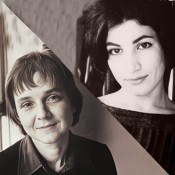


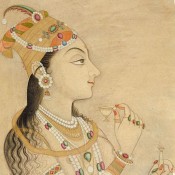

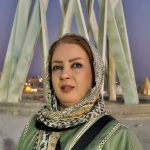

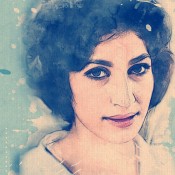

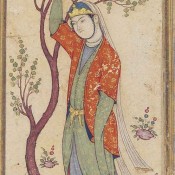
![Fatemeh Shams Photo 2 [FS]](https://poets.iranicaonline.org/wp-content/uploads/2022/11/Fatemeh-Shams-Photo-2-FS-150x150.png)


